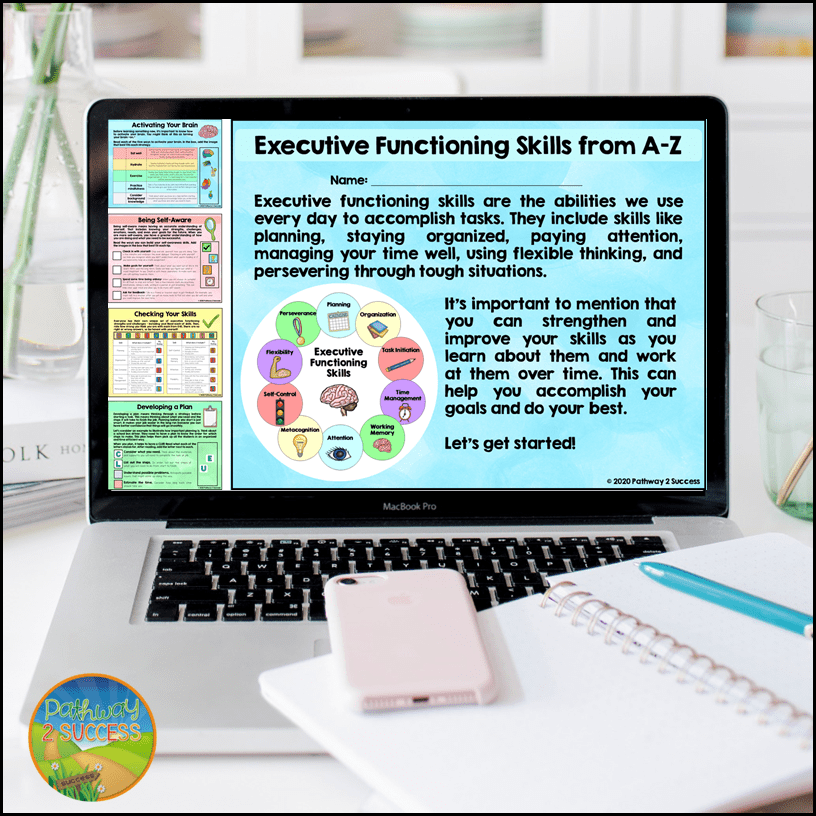
Executive functioning skills are the complicated processes in our brains that help us accomplish everyday tasks. For kids and teens, these tasks might be things like starting morning work after entering the classroom, working through a long-term project, bringing the correct materials to class, and raising a hand to share thought in class.
For many of us with stronger executive functioning skills, we might take some of these tasks for granted. It’s worth mentioning, though, that these activities do not come easy for kids and teens who struggle with basic EF skills. If you work with a child or teenager who has difficulty with organization, planning, time management, attention, or self-control, you already know.
The good news is that executive functioning skills can be worked on in different ways. One technique is teaching the skills explicitly. This includes teaching about how the brain works, what it looks like to be organized, and how to manage work on a daily basis. I’ve recently created an executive functioning interactive workbook to work on 40 different skills. If you just want to get started with some explicit instruction, you can give that a try.

Teach executive functioning skills explicitly with an interactive workbook.
Teaching EF skills outright isn’t the only answer, though. There are many different ways these skills can be taught and integrated throughout the day. Making these skills part of your everyday can be extremely beneficial, since it reinforces the idea that these are in fact life skills we use often.
Here are 25+ Everyday Ways to Build Executive Functioning Skills:
Play board games. A number of board games target different executive functioning skills when you think about it. Scrabble works on flexibility and planning. Chess targets planning and working memory. Need more ideas? Read more about different games to target executive functioning skills.

Use think alouds. Thinking aloud while you work through problems is a healthy way to train kids and teens those same steps. For example, if you misplace something and you’re looking for it, you might say, “I can’t find my ___. Let me think about where I was last. First, I’ll check there.” This example is quite simple but can be done with virtually any task. Think alouds help kids and teens understand the step-by-step process we take to complete tasks.
Ask executive functioning-building questions. What are three tasks you need to accomplish today? What are some possible triggers that might cause you to lose your cool? What are ways you can study for a quiz? These simple questions can help ignite discussions about executive functioning skills. You can come up with your own or use these executive functioning task cards that are ready to go!

Talk about time. Many kids and teens struggle with a sense of time. Talking about time and deadlines can help them make sense of this mystery. For example, you might say, “We have 10 minutes left before going to lunch. That gives us enough time to stop what we’re doing and clean up before we need to be there.”
Organize or clean together. Start small and work together to clean or tidy some areas in the classroom or house. For example, choose to tidy up a bookshelf by putting books back in a neat way. If this is a difficult task for kids, take turns. Make it more fun by listening to music or chatting as you organize.
Give time to be bored. In our digital world, kids and teens are often too busy. Give time to be bored by losing the gadgets and giving downtime. Kids and teens can color, draw, build, or play games. The options are endless, and this is a great way to build on flexibility, creativity, and perseverance.

Make a schedule. Before starting each day, take a few minutes and write out the schedule. This is a helpful technique to model for kids and teens, but it also gives them an overview of what to expect for the day.
Estimate time to complete tasks. Before doing any activity, stop and think out loud about how long you think it will take you to finish. You can even time yourself and assess how well you estimated. This can be done with practically anything, but a few examples are tidying up a room, writing homework down, or getting cleaned up with an activity.

Use literature to talk about executive functioning skills. From organization to perseverance, many different picture books (and chapter books) can guide you through these skills. Planning Isn’t My Priority by Julia Cook is a great book to talk about study habits and planning, for example. Read here for a more comprehensive list of books to support social emotional learning skills.
Take breaks when you need them. Teach that taking breaks can be a healthy strategy to improve focus and motivation. Use these mindful brain breaks with a nature focus to get the practice started in a fun way.

Build something out of nothing. Gather materials and give free design time. This can be crafts, building, or even inventing something new. Hands-on activities allow for problem-solving, flexibility, and creativity.
Learn something new. Choose a topic or idea and learn together! For example, if a teen is interested in outer space, make a list of questions you might wonder and look them up together. Read books and watch movies. You can also let kids and teens explore a new idea or hobby entirely on their own. This also serves as an important reminder that learning should be a lifelong activity.

Write in a planner or calendar. A simple daily task with lifelong benefits, writing in a planner (or calendar) helps kids build on planning, organization, and time management skills. Make it a habit to keep a calendar updated on regular basis, and if a child is old enough, have them keep one too!
Play sports. Many sports target a number of executive functioning skills from attention and flexibility to perseverance and self-control. As you play, talk about the skills! For example, if you are playing basketball, you might talk about how it is important to stay focused on the ball.

Hold a conversation. Chatting about topics is a great way to work on attention and working memory while also targeting a variety of other social skills. Use this free printable list of questions to get the conversation started.
Do arts and crafts. Spend time working with your hands to increase focus and creativity. Crafts are also an engaging way to work on a variety of social emotional skills.

Practice mental math. Math problems are one of the best ways to work on working memory with kids and teens. Make it more fun by taking turns. After you give a math problem for them to solve, make sure they give you a challenging one right back.
Write in a journal. Spend a few minutes a day dedicated to journal writing time. This can be free write time or writing on a given topic.
Make lists for tasks. In the classroom, you can make a list before starting a new project or beginning a new lesson. At home, lists come in handy before going grocery shopping or beginning homework. Make lists and check tasks off as you go to model organization and planning skills.

Do puzzles. Problem-solving, flexibility, organization, planning, and working memory are all skills used when working through puzzles. Use hands-on puzzles or find a digital version!
Exercise. While exercise itself doesn’t improve executive functioning skills, it paves the way for the real learning to happen. Make it a routine to exercise or stretch in the morning or before a study session.

Role-play through situations and problems. Help kids and teens problem-solve by working through real-life problems. When something comes up, act out how you might work through it.
Practice coping strategies. Simply put, coping strategies should be practiced every day! This is to help kids and teens be able to use them when they need them the most. Use this list of 100 coping strategies for kids and teens to get started.

Act out scenes from movies. Reciting scenes can be a highly motivating way to strengthen attention and memory skills.
Talk through “what would you do?” situations. Use real-life situations to talk through what you would do. This is a helpful technique to activate the brain before encountering situations. Come up with your own scenarios or use these problem-solving cards to get started.

Discuss goals. Talk about the goal you are working on. Discuss the plans and reflect on progress. Every day you can do at least one small thing to work towards those goals. It’s important for kids and teens to see this early on!
Use brain games. Mental puzzles work on executive functioning skills, but all along feel like a game! Some of my favorite brain games are brainteasers. Use this executive functioning brain games workbook to help kids and teens unlock their brain powers.

Add a new ending to a book or movie. Help kids and teens think outside the box by adding a new ending to a book you’ve read or movie you’ve seen.
Reward yourself after finishing a task. Sometimes our culture is so driven on work that we forget to reward ourselves. This is a critical element to helping kids and teens feel proud of the work they’ve accomplished. Whether it’s a quick break, time watching a quick video clip, or an ice cream, it’s okay to give yourself a reward sometimes.







Leave a Reply